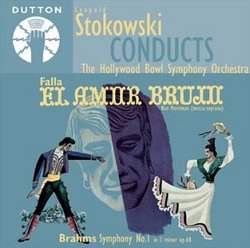| All Artists: Brahms, Falla, Hollywood Bowl So, Stokowski Title: Symphony 1 / El Amor Brujo Members Wishing: 0 Total Copies: 0 Label: Dutton Labs UK Release Date: 11/14/2000 Album Type: Import Genre: Classical Styles: Ballets & Dances, Ballets, Historical Periods, Modern, 20th, & 21st Century, Symphonies Number of Discs: 1 SwapaCD Credits: 1 UPC: 765387970529 |
Search - Brahms, Falla, Hollywood Bowl So :: Symphony 1 / El Amor Brujo
 | Brahms, Falla, Hollywood Bowl So Symphony 1 / El Amor Brujo Genre: Classical
|
Larger Image |
CD Details |
CD ReviewsVintage Stokowski Joseph A. Zannieri | Norwalk, OH USA | 01/08/2009 (3 out of 5 stars) "There are other, better Stokowski recordings of the Brahms First. But, there are no better Stokowski recordings of the dark, atmospheric DeFalla ballet "El Amor Brujo". Stoki did it again in 1960, with the Philadelphia Orchestra and Shirley Verrett, but, in my opinion, Verrett loses out to Merriman's sensual interpretation. The transfer, unfortunately, is not the best. It has been really hammered with noise reduction software, so that the mids and highs, to the extent that they still exist, have a noticeable, "twisted", out of phase quality. The sibilants are completely gone, making it sometimes difficult to understand the words. They have also added a little artificial reverb to it, which diminishes the rhythmic drive that Stoki lays on it. Merriman, however, is superb. Also, though there are better transfers of her vocal parts of this recording, (Lebendige Vergangheit Nan Merriman for sale on Amazon) this is the only complete transfer of the whole recording. Even with its less than ideal sonics, it is well worth having as a document of Merriman's excellent performance, in the context of the complete piece. As a complete transfer of a truly stellar performance of an unusual piece, it is worth having." Unique David Saemann | 11/10/2008 (4 out of 5 stars) "Stokowski rerecorded both of these works in stereo, but this CD is valuable for presenting his takes on these pieces earlier in his career. The Falla, from 1946, is a stunning achievement. The sound engineering is crisp, with a wide dynamic range, but perhaps not as full as it might have been. Throughout, the orchestra's playing is exceptional, not least in the propulsive, fiery hot version of the Ritual Fire Dance. Nan Merriman's contribution is truly exceptional. Stokowski himself called it musical perfection, in that it combined true Spanish style with rock solid technique. The Brahms, from 1945, is more controversial. First of all, the sound engineering, from the Hollywood Bowl, has a lot of echo, so important passages frequently are obscured. Secondly, although Stokowski conducts a taut, exciting reading, there are details that really seem inimical to a true appreciation of Brahms. The string sound is rich and caloric, more in the manner of Rachmaninoff, so that the statement of the last movement's main theme feels like a mountain of rich chocolate. The chorale in the coda is VERY SLOW, with phrasing that sounds like it belongs in a science fiction movie. I am reminded of what Sibelius said about Stokowski: I am sure Mr. Stokowski is an interesting man, with many interests, but music is not one of them. I wouldn't go that far, but I would say that the Stokowski Brahms Firsts with the All-American Youth Orchestra and the London Symphony are more satisfying than the one on this CD." Stokowski in Hollywood, in excellent remasterings Santa Fe Listener | Santa Fe, NM USA | 03/08/2007 (5 out of 5 stars) "These two works were recorded with the Hollywood Bowl Orch., a summer group that Stokowski often conducted in the Forties. The Brahms Sym. #1 dates from 1945, its odd disc-mate, Falla's El Amor Brujo, from 1946. As an interpretation, the Falla will win over anyone--it's fiery, dramatic, and unyielding in its forward drive. Stokowski doesn't linger over the Spanish atmosphere but concentrates on the ballet's stark scenario, the tale of a jealous gypsy ghost and the widow who craves a new lover but cannot escape her dead husband's sexual fierceness. Nan Merriman sings with an appropriately flint-edged tone to communicate the woman's plight, and the recorded sound is really fine. Dutton's remastering expands orchetral color and dynamics further than one might believe possible; although in mono, almost every trace of hiss is gone. Only the somewhat cramped acoustic betrays the recording's age.
The Brahms First is in just as good sound, but one gets the impression that the original 78 records used as Dutton's source are more worn; loud passages turn a bit fuzzy. Even so, this is warmer and fuller-sounding than Toscanini's Brahms from the same era, on a par with the best of Furtwangler. I run hot and cold about Stokowski's Brahms, but this reading is exciting without being eccentric (until we get to some pell-mell speed-ups at the last movement). He was always a buoyant Brahms conductor, steering away from turmoil and tragedy. The symphony is played with eloquence and great intensity in its extroverted way--you won't hear too many readings like it. Be prepared for pushing and pulling in the finale, especially at the entry of the big tune. If that doesn't throw you off (it irked critics at the time), this theatrical First is one of Stokowski's best efforts at Brahms." |

 Track Listings (14) - Disc #1
Track Listings (14) - Disc #1